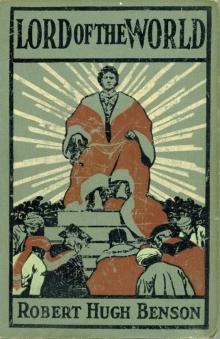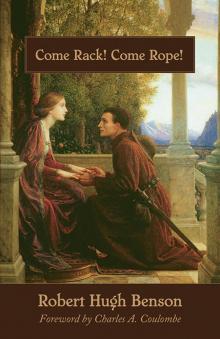- Home
- Robert Hugh Benson
The Dawn of All Page 30
The Dawn of All Read online
Page 30
(V)
They read in the morning the full text of the proclamation tothe Socialists.
As Monsignor Masterman carne up from breakfast, he felt his armtaken, and there was Father Jervis, his clever old face lit up byexcitement. He too carried a morning paper under his arm.
"I want to have a talk with you about this," he said, "Have youseen the Cardinal yet?"
"I'm to see him at ten. I feel perfectly helpless. I don'tunderstand in the least."
"Have you read it through yet?"
"No, I glanced at it only. I wish you'd help me through, father."
The old priest nodded.
"Well, we'll read every word of it first,"
As they passed into the sitting-room, the prelate slipped forwardthe little door-plate that announced that he was within, butengaged. Then, without a word, they sat down, and there was deadsilence for twenty minutes, broken only by the rustle of turningpages, and an occasional murmur of raised voices from the groupsthat still wandered round the Cathedral--pools of that vast riverthat had filled every channel last night. Father Jervis uttered asmall exclamation once or twice.
Monsignor laid down the sheets at last and sighed.
"Finished, father?"
"Oh, yes! I've been re-reading. Now let us talk."
Father Jervis turned back to the front page, settled the paper onhis knee, and leaned back.
"The main point is this," he said. "Repressive measures will bepassed in Germany, as soon as the act can be got through. Thatwill mean that Germany will be brought up into line with the restof Europe, America, Australia, and half Asia, throughout herwhole empire. That will mean again that our own repressivemeasures will really and truly be put into force. At present theyare largely inoperative."
"How do you mean?"
"Well, we've got laws against things like blasphemy and heresy,and particularly the dissemination of heresy, and all the rest;but they're practically never put into force except in veryflagrant cases. For instance, Socialist and infidel speeches canbe delivered freely in what are called private houses, which arereally clubs. Well, that sort of thing cannot possibly go on. Theinfidels have complained of tyranny, of course--that's part ofthe game. As a matter of fact they've been perfectly free, unlessthey gave actually public offence. They've distributed theirpamphlets and done what they liked. Well, of course it wasimpossible to be really strict so long as Germany was lax. Theycould always meet in Berlin, and have their pamphlets printedthere; and we could do nothing. But, you see, the wholesituation's changed with the Emperor's conversion. He's one ofthose heavy, consistent men--quite stupid, of course--who acttheir principles right out to the farthest detail. So long as hewas agnostic he allowed almost anything to go on. And now he's aChristian he'll understand that that must stop. He's responsiblebefore God, you see, as the ruler----"
"But the people. What of the people?"
Father Jervis stared.
"The people? Why, they're the ruled, aren't they?"
"But--er--democracy----"
"Democracy? Why, no one believes in that, of course. How could they?"
"Go on, father."
"But, Monsignor, you must get that clear. You must remember we'rereally educated people, not half-educated."
Monsignor twitched with irritation. He could not understand even yet.
"Father, do you mean that the people won't resent this suddenchange of front on the part of the Emperor? Certainly, ifthey're really liberally-minded they'll tolerate his followinghis own conscience. But how can they justify his suddenlydictating to them?"
The priest leaned forward a little. His old manner came back, andonce more he spoke to Monsignor as to a child.
"Monsignor, listen carefully, please. I assure you you'recompletely out of date. What the German people will say now isthis: 'Up to now the Emperor has been agnostic, and therefore hehas not allowed any laws against heresy. Now he is a Catholic,and therefore he will cause laws to be passed against heresy.'"
"And they won't resent that?" snapped the prelate, nowthoroughly irritated.
Father Jervis lifted a pacific hand.
"My dear friend, the Germans--like all other educatednations--believe that their ruler is meant by God to rule them.And they also believe that Catholicism is the true religion. Verywell, then. When a ruler is Catholic they obey him implicitly,because they know that he will be kept straight in all matters ofright and wrong by the Pope, who is the Representative of God. Innon-vital matters they will obey him because he is their ruler,and therefore they are bound in conscience to do so."
"And when the ruler is not Catholic?"
"Again, in non-vital matters they will obey him. And in vitalmatters--supposing, that is, he passed a law against Christianity(which, of course, nowadays no man could certainly do)--then theywould appeal to the Pope, and, if the law was enforced, disobeyit and take the penalties."
"Then the Pope is the real ruler--the final court of appeal?"
"Certainly. Who else should be? Isn't he the Vicar of Christ?"
There was a pause.
"There," said the priest more easily. "And now we really must getback to the point. I said just now that the conversion of theEmperor will mean a tightening up of repressive measures againstthe infidels everywhere. They won't be allowed to congregate, ordisseminate their views any longer."
"Yes?"
"Well, the point is, what will happen? There must be anexplosion or a safety-valve. And even if there is an explosionthere must be a safety-valve afterwards, or there will beanother explosion."
"What you told me about America----"
"That was on the tip of my tongue," said Father Jervis. "And Iexpect that'll be the solution."
"Let's see," said Monsignor reflectively, "you told me there werecertain cities in America where infidels were tacitly allowed tohave things their own way--I think you mentioned Boston?"
"I did."
"And you think that that will be officially authorized now--Imean that there will be definite colonies where the infidels willbe allowed complete liberty?"
"Under restrictions--yes."
"What sort of restrictions?"
"Well, they won't be allowed to have an army or an aery----"
"Eh?"
"An aery," repeated Father Jervis--"an air-fleet, I mean. Thatwouldn't do: they might make war."
"I see."
"I don't see what better safety-valve could be suggested. Theycould work out their own ideas there as much as they liked. Ofcourse, details would come later."
"And the rest of the Proclamation?" asked the other,lifting the sheet.
"I think we've got at the essentials," said the priest, glancingagain at his own copy, "and at the immediate results. Of course,all his other measures don't come into force till the Houses passthem. In fact, nothing of the Proclamation has force until thathappens. I expect the Bill for the Establishment of Catholicismwill take some time. We shall get ours through before that.They'll pass a few small measures immediately, no doubt--as tothe Court chaplains and so on."
There was a pause.
"I really think we've got at the principles," said the priestagain, meditatively. "Are they clear to you?"
Monsignor rose.
"I think so," he said. "I'm very much obliged, Father. I'm sorryI was stupid just now; but you know it's extraordinarilybewildering to me. I still don't seem to be able to grasp all yousaid about Democracy."
The old priest smiled reassuringly.
"Well, you see, the universal franchise reduced Democracy _adabsurdum_ fifty years ago. Even the uneducated saw that. And thenthere came the reaction to the old king-idea again."
Monsignor shook his head.
"I don't see how the people ever consented to give up the powerwhen once they'd got it."
"Why, in the same way that kings used to lose it in the olddays--by revolution."
"Revolution? Who revolted?"
"The many who were tyrannised over by the few. For that's whatdemocracy
really means."
Monsignor smiled at what he conceived to be a paradox.
"Well, I must go to the Cardinal," he said. "It's just on ten o'clock."
CHAPTER II

 The Dawn of All
The Dawn of All By What Authority?
By What Authority? The King's Achievement
The King's Achievement Lord of the World
Lord of the World The History of Richard Raynal, Solitary
The History of Richard Raynal, Solitary Come Rack, Come Rope
Come Rack, Come Rope